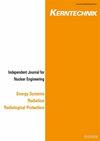Experimental investigation of heat transfer characteristics of inclined aluminium two phase closed thermosyphon
IF 0.9
4区 工程技术
Q4 NUCLEAR SCIENCE & TECHNOLOGY
引用次数: 0
Abstract
Abstract A reduction in the size of electronic equipment increases the heat generation rate. Failure of electronic equipment occurs if the heat is not dissipated properly. This paper examines the performance of aluminium two-phase closed thermosyphon for cooling electronic equipment. Acetone charged aluminium two-phase closed thermosyphon was fabricated with an inside diameter of 17.05 mm and 1 mm thickness. A series of experimentations were performed for inclination angles of 10°–90° at selected filling ratios of 30, 60 and 100 %, along with heat inputs of 100, 200 and 300 W. The condenser section flow rate of water was maintained constant. Minimum thermal resistance was obtained at a 30° inclination angle for all filling ratios and heat inputs. The evaporator and condenser sections have a maximum heat transfer coefficient at a 30° inclination angle. Thermosyphon, with a 30 % or 60 % filling ratio, performed better than a 100 % filling ratio for all inclination angles and heat inputs. As the heat input was increased, the heat transfer coefficients of the evaporator and condenser section were increased, whereas total thermal resistance decreased. For 300 W heat input and 30 % filling ratio, the minimum thermal resistance at a 30° inclination angle was 0.158 °C/W. It is found that, the same heat input and filling ratio, the maximum heat transfer coefficient value for the evaporator and condenser section at a 30° inclination angle was 1602 W/m 2 °C and 5652 W/m 2 °C, respectively.倾斜铝两相封闭热虹吸管传热特性的实验研究
电子设备体积的减小会增加发热率。如果散热不正常,会导致电子设备故障。本文研究了用于冷却电子设备的铝两相封闭式热虹吸管的性能。制备了内径为17.05 mm、厚度为1mm的丙酮充铝两相封闭式热虹吸管。在填充率为30%、60%和100%、热输入为100、200和300 W的情况下,在倾角为10°-90°范围内进行了一系列实验。冷凝器段水流保持恒定。在所有填充比和热输入的30°倾角下获得最小热阻。蒸发器和冷凝器在倾角为30°时传热系数最大。对于所有倾角和热输入,30%或60%填充率的热虹吸比100%填充率表现更好。随着热输入量的增加,蒸发器和冷凝器的换热系数增大,总热阻减小。当热输入300w,填充率30%时,30°倾角下的最小热阻为0.158℃/W。研究发现,在相同的热量输入和填充比下,30°倾角下蒸发器段和冷凝器段的最大换热系数分别为1602 W/m 2°C和5652 W/m 2°C。
本文章由计算机程序翻译,如有差异,请以英文原文为准。
求助全文
约1分钟内获得全文
求助全文
来源期刊

Kerntechnik
工程技术-核科学技术
CiteScore
0.90
自引率
20.00%
发文量
72
审稿时长
6-12 weeks
期刊介绍:
Kerntechnik is an independent journal for nuclear engineering (including design, operation, safety and economics of nuclear power stations, research reactors and simulators), energy systems, radiation (ionizing radiation in industry, medicine and research) and radiological protection (biological effects of ionizing radiation, the system of protection for occupational, medical and public exposures, the assessment of doses, operational protection and safety programs, management of radioactive wastes, decommissioning and regulatory requirements).
 求助内容:
求助内容: 应助结果提醒方式:
应助结果提醒方式:


